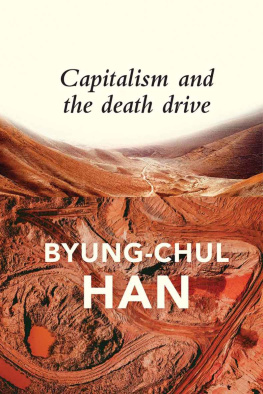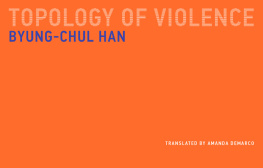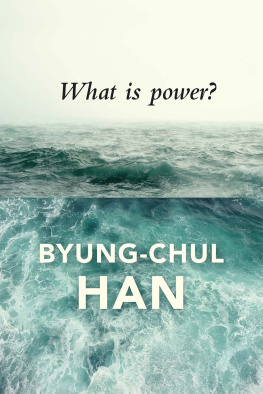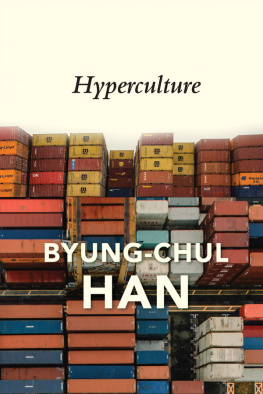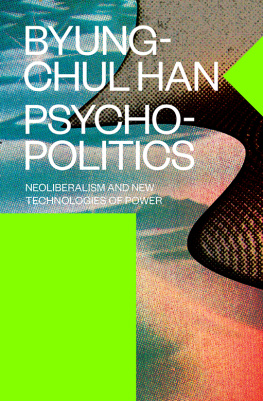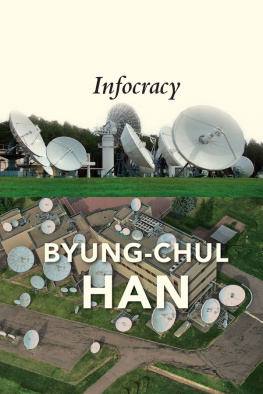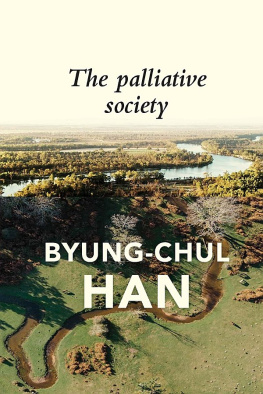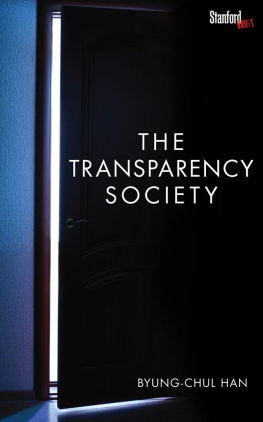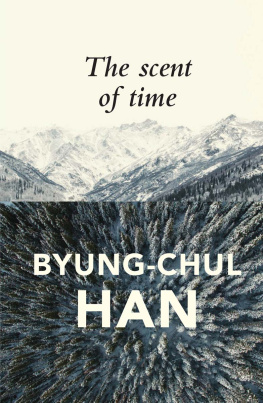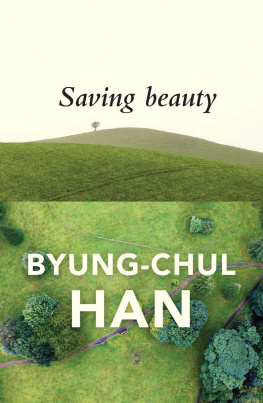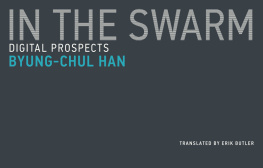Byung-Chul Han - Capitalism and the Death Drive
Here you can read online Byung-Chul Han - Capitalism and the Death Drive full text of the book (entire story) in english for free. Download pdf and epub, get meaning, cover and reviews about this ebook. year: 2021, publisher: Wiley, genre: Religion. Description of the work, (preface) as well as reviews are available. Best literature library LitArk.com created for fans of good reading and offers a wide selection of genres:
Romance novel
Science fiction
Adventure
Detective
Science
History
Home and family
Prose
Art
Politics
Computer
Non-fiction
Religion
Business
Children
Humor
Choose a favorite category and find really read worthwhile books. Enjoy immersion in the world of imagination, feel the emotions of the characters or learn something new for yourself, make an fascinating discovery.
- Book:Capitalism and the Death Drive
- Author:
- Publisher:Wiley
- Genre:
- Year:2021
- Rating:5 / 5
- Favourites:Add to favourites
- Your mark:
- 100
- 1
- 2
- 3
- 4
- 5
Capitalism and the Death Drive: summary, description and annotation
We offer to read an annotation, description, summary or preface (depends on what the author of the book "Capitalism and the Death Drive" wrote himself). If you haven't found the necessary information about the book — write in the comments, we will try to find it.
Capitalism and the Death Drive — read online for free the complete book (whole text) full work
Below is the text of the book, divided by pages. System saving the place of the last page read, allows you to conveniently read the book "Capitalism and the Death Drive" online for free, without having to search again every time where you left off. Put a bookmark, and you can go to the page where you finished reading at any time.
Font size:
Interval:
Bookmark:
Byung-Chul Han
Translated by Daniel Steuer
polity
Originally published in German as Kapitalismus und Todestrieb MSB Matthes & Seitz Berlin Verlagsgesellschaft mbH, Berlin 2019. All rights reserved.
This English edition Polity Press, 2021
Excerpt from Tur mir Leid, aber das sind die Tatsachen by Niels Boeing and Andreas Lebert in Die Zeit 5 (August 2014) Die Zeit. Reprinted with permission of Die Zeit.
Interview Byung-Chul Han: COVID-19 has reduced us to a society of survival by Carmen Sigenza and Esther Rebollo, published on EURACTIV in May 2020 EFE with EURACTIV. com. Reprinted with permission of EURACTIV.
Polity Press
65 Bridge Street
Cambridge CB2 1UR, UK
Polity Press
101 Station Landing
Suite 300
Medford, MA 02155, USA
All rights reserved. Except for the quotation of short passages for the purpose of criticism and review, no part of this publication may be reproduced, stored in a retrieval system or transmitted, in any form or by any means, electronic, mechanical, photocopying, recording or otherwise, without the prior permission of the publisher.
ISBN-13: 978-1-5095-4502-5
A catalogue record for this book is available from the British Library.
Library of Congress Cataloging-in-Publication Data
Names: Han, Byung-Chul, author. | Steuer, Daniel, translator.
Title: Capitalism and the death drive / Byung-Chul Han ; translated by Daniel Steuer.
Other titles: Kapitalismus und Todestrie. English
Description: Cambridge, United Kingdom ; Medford, MA : Polity Press, [2021] | Originally published in German as Kapitalismus und Todestrieb MSB Matthes & Seitz Berlin Verlagsgesellschaft mbH, Berlin 2019--Title page verso. | Includes bibliographical references. | Summary: A leading cultural theorist examines the inherent destructiveness of capitalism--Provided by publisher.
Identifiers: LCCN 2020053305 (print) | LCCN 2020053306 (ebook) | ISBN 9781509545018 (hardback) | ISBN 9781509545001 (paperback) | ISBN 9781509545025 (epub) | ISBN 9781509547661 (pdf)
Subjects: LCSH: Capitalism--Moral and ethical aspects. | Capitalism--Social aspects.
Classification: LCC HB501 .H33413 2021 (print) | LCC HB501 (ebook) | DDC 330.12/2--dc23
LC record available at https://lccn.loc.gov/2020053305
LC ebook record available at https://lccn.loc.gov/2020053306
The publisher has used its best endeavours to ensure that the URLs for external websites referred to in this book are correct and active at the time of going to press. However, the publisher has no responsibility for the websites and can make no guarantee that a site will remain live or that the content is or will remain appropriate.
Every effort has been made to trace all copyright holders, but if any have been overlooked the publisher will be pleased to include any necessary credits in any subsequent reprint or edition.
For further information on Polity, visit our website: politybooks.com
Capitalism and the Death Drive appears for the first time in this volume.
Why Revolution Is Impossible Today was first published in Sddeutsche Zeitung, 3 September 2014.
The Total Exploitation of the Human Being was first published in Sddeutsche Zeitung, 20 June 2016.
Inside the Digital Panopticon was first published in Der Spiegel 02/2014.
Only What Is Dead Is Transparent was first published in Die Zeit 03/2012.
Dataism and Nihilism was first published in Die Zeit 40/ 2013.
Torturous Emptiness was first published in Die Welt, 30 December 2015, under the title: Qulende Leere: Narzissmus ist der Grund fr Selfies und Terror [Torturous Emptiness: Narcissism Is the Reason for Selfies and Terror].
Jumping Humans was first published in Die Zeit 04/2016.
Where Do the Refugees Come From? was first published in Der Tagesspiegel, 17 September 2015.
Where the Wild Things Are was first published in Die Welt, 8 September 2015.
Who Is a Refugee? was first published in Frankfurter Allgemeine Zeitung, 24 January 2017.
Beauty Lies Yonder, in the Foreign was first published in Die Welt, 24 November 2017, under the title Deutsche sollten Deutsche bleiben [Germans Should Remain Germans].
The Big Rush was first published in Die Zeit 25/2013, under the title Alles eilt: Wie wir die Zeit erleben [The Big Rush: How We Experience Time].
In Your Face was first published in Blau: Ein Kunstmagazin No. 9, March 2016, pp. 1314.
The End of Liberalism: The Coronavirus Pandemic and Its Consequences appears for the first time in this volume.
It Is Eros That Defeats Depression was first published in Philosophie Magazin 05/2012 Philosophie Magazin, Berlin 2012.
Capitalism Dislikes Silence was first published in 1. Spielzeitheft der Schaubhne am Lehniner Platz 2013/14 Florian Borchmeyer and Thomas Ostermeier, Berlin 2013.
The interview Byung-Chul Han: COVID-19 Has Reduced Us to a Society of Survival by Carmen Sigenza and Esther Rebollo was first published on EURACTIV in May 2020 EFE with EURACTIV.com. Reprinted with permission of EURACTIV. At https://www.euractiv.com/section/global-europe/interview/byung-chul-han-covid-19-has-reduced-us-to-a-society-of-survival (last accessed 3 December 2020).
Excerpt from Tur mir Leid, aber das sind die Tatsachen [I Am Sorry, But These Are the Facts] by Niels Boeing and Andreas Lebert in Die Zeit, 5 (August 2014) Die Zeit. Reprinted with permission of Die Zeit.
What we nowadays call growth is in reality random, cancerous proliferation. We are currently living through a frenzy of production and growth that seems like a frenzy of death. It is a simulation of vitality that conceals a deadly impending catastrophe. Production increasingly resembles destruction. Humankinds self-alienation may have reached a point where it can experience its own annihilation as a supreme aesthetic pleasure. What Benjamin said of fascism is today true of capitalism.
It is on account of our destructive rage that Arthur Schnitzler compares humankind to a bacterium. From this perspective, the history of humanity is like the progress of a deadly infectious disease. Growth and destruction become one and the same:
Is it then not conceivable that, for some higher organism that we are incapable of grasping in its totality, and within which humankind finds the condition, necessity and meaning of its own existence, humankind represents an illness that tries to destroy that organism and the further it develops must destroy it, the same way a bacterium seeks to annihilate the human individual who has been taken ill?
Humankind is blighted by a deadly blindness. We can only recognize the simpler levels of organization; regarding higher orders, we are as blind as bacteria. Thus, the history of humanity is an eternal battle against the divine, which is necessarily annihilated by the human.
Freud would have shared every ounce of Schnitzlers pessimism. The human being, with his cruel aggressiveness, he writes in Civilization and Its Discontents, is a savage beast to whom consideration towards his own kind is something alien. Only a few months after the completion of Civilization and Its Discontents, the Great Depression began. It would have provided Freud, one might think, with enough reasons to say that capitalism is that economic formation in which the savagery and aggression of the human being can best be expressed.
Given capitalisms destructiveness, it seems plausible to connect capitalism with Freuds death drive. In his study
Font size:
Interval:
Bookmark:
Similar books «Capitalism and the Death Drive»
Look at similar books to Capitalism and the Death Drive. We have selected literature similar in name and meaning in the hope of providing readers with more options to find new, interesting, not yet read works.
Discussion, reviews of the book Capitalism and the Death Drive and just readers' own opinions. Leave your comments, write what you think about the work, its meaning or the main characters. Specify what exactly you liked and what you didn't like, and why you think so.

